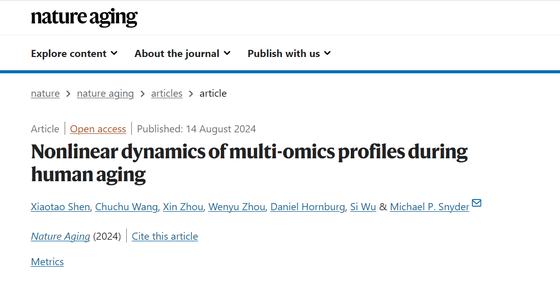It turns out that human aging progresses dramatically in two stages, at around age 44 and around age 60

As people get older, they realize they are getting old by getting more wrinkles, feeling pain in their joints, and suddenly feeling unwell. A research team at Stanford University announced the results of a study that showed that 'people do not age gradually at a constant rate, but there are two points in their lives when aging accelerates rapidly.'
Nonlinear dynamics of multi-omics profiles during human aging | Nature Aging
https://www.nature.com/articles/s43587-024-00692-2

Scientists find humans age dramatically in two bursts – at 44, then 60 | Medical research | The Guardian
https://www.theguardian.com/science/article/2024/aug/14/scientists-find-humans-age-dramatically-in-two-bursts-at-44-then-60-aging-not-slow-and-steady
The study involved 108 people aged between 25 and 75. Participants provided blood, stool, skin, oral and nasal samples every few months for one to seven years. The team analyzed 135,000 types of RNA, proteins, metabolites, bacteria, viruses, fungi and other molecules from the samples and tracked how the amounts of these molecules and microorganisms changed.
The team found that most of the molecules and microbes in the blood did not change gradually, but rather showed large fluctuations at specific ages, with particularly significant changes occurring around ages 44 and 60.
'We had previously speculated that aging in women's mid-40s might be due to premenopausal changes, but our data showed that similar changes were occurring in men as well,' said lead author Xiaotao Shen, a postdoctoral researcher at the Stanford University School of Medicine.

According to the research team, at around age 44, there were significant changes in the amounts of molecules related to caffeine, alcohol, and lipid metabolism, as well as cardiovascular disease. In addition, at around age 60, there were changes in the amounts of molecules related to immunity, carbohydrate metabolism, and kidney function. Furthermore, changes were observed in molecules related to skin and muscle aging at both ages 44 and 60.
'We don't change gradually; we go through very dramatic changes,' said Michael Snyder, a geneticist at Stanford University. 'We see particularly large changes in all kinds of molecules in our mid-40s and early 60s.'

'I'm a big believer in adjusting your lifestyle while you're still healthy,' said Professor Snyder, emphasizing the importance of preventive health management based on research results.
Related Posts:
in Science, Posted by log1i_yk







